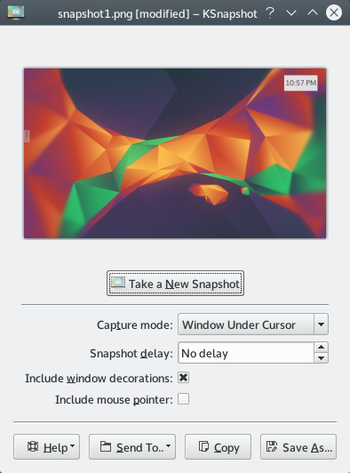KSnapshot/fr: Difference between revisions
Created page with "Peut-être n'aimez-vous pas l'image qui a été prise. Heureusement, vous pouvez facilement en prendre une autre en cliquant sur le bouton <menuchoice>Prendre une nouvelle cap..." |
Created page with "=== Enregistrer l'image ===" |
||
| Line 15: | Line 15: | ||
Peut-être n'aimez-vous pas l'image qui a été prise. Heureusement, vous pouvez facilement en prendre une autre en cliquant sur le bouton <menuchoice>Prendre une nouvelle capture</menuchoice>, comme montré sur l'image en haut de cette page. | Peut-être n'aimez-vous pas l'image qui a été prise. Heureusement, vous pouvez facilement en prendre une autre en cliquant sur le bouton <menuchoice>Prendre une nouvelle capture</menuchoice>, comme montré sur l'image en haut de cette page. | ||
=== | === Enregistrer l'image === | ||
What use would this program be if you couldn't save your image afterwards? '''KSnapshot''' allows you to save your picture in many file formats. Below is a list of all of them; | What use would this program be if you couldn't save your image afterwards? '''KSnapshot''' allows you to save your picture in many file formats. Below is a list of all of them; | ||
Revision as of 19:21, 8 August 2012
 |
KSnapshot est un utilitaire pratique principalement conçu pour prendre des captures d'écran |
Introduction
Avez-vous déjà voulu montrer au monde à quel point les logiciels KDE sont géniaux, ce dernier niveau que vous venez de battre dans votre jeu ou peut-être votre aquarium virtuel ? KSnapshot saisira tous ces moments et vous laissera même personnaliser à quoi ressemblera l'image finale une fois enregistrée.
Fonctionnalités
Prendre une nouvelle capture d'écran
Peut-être n'aimez-vous pas l'image qui a été prise. Heureusement, vous pouvez facilement en prendre une autre en cliquant sur le bouton , comme montré sur l'image en haut de cette page.
Enregistrer l'image
What use would this program be if you couldn't save your image afterwards? KSnapshot allows you to save your picture in many file formats. Below is a list of all of them;
- Windows BMP image (.bmp)
- EPS image (.eps)
- JPEG-2000 image (.jp2)
- JPEG image (.jpeg)
- MNG animation (.mng)
- PBM image (.pbm)
- PCX image (.pcx)
- Softimage PIC image (.pic)
- PNG image (.png)
- PGM image (.pgm)
- PPM image (.ppm)
- RGB image (.rgb)
- TGA image (.tga)
- TIFF image (.tif)
- XBM image (.xbm)
- XPM image (.xpm)
With regard to what format you should save your image as, this depends on your needs. The most common image formats found today are png and jpeg. The other formats are still useful for various other uses.
Send to
This allows you to open the image in an external application (such as KolourPaint or Krita). Perhaps you wish to edit the image or add something to it. Using a external application in this scenario would be a good idea. The image may also be printed.
Using KIPI plugins, the image be sent to a contact by e-mail or Kopete, sent to an online gallery such as Flickr or PicasaWeb, or sent to a social networking site, such as Facebook.
Copy to clipboard
This means that you will be able to paste the image (generally Ctrl + V) into another program or document that supports image pasting.
Capture mode
This will further change how the image will look when it's finally saved. Options here include;
- Fullscreen: Everything is captured
- Window under cursor: Window contents below the cursor
- Region: Capture a specific region
- Section of window: A portion of an active window
- Current screen: Present screen
Snapshot delay
Set a timer here (in seconds). For example putting this up to 10 seconds will make KSnapshot wait 10 seconds until the screenshot is taken. This is particularly useful if you need to capture drop-down menus, or anything else that only responds to a mouse action.
